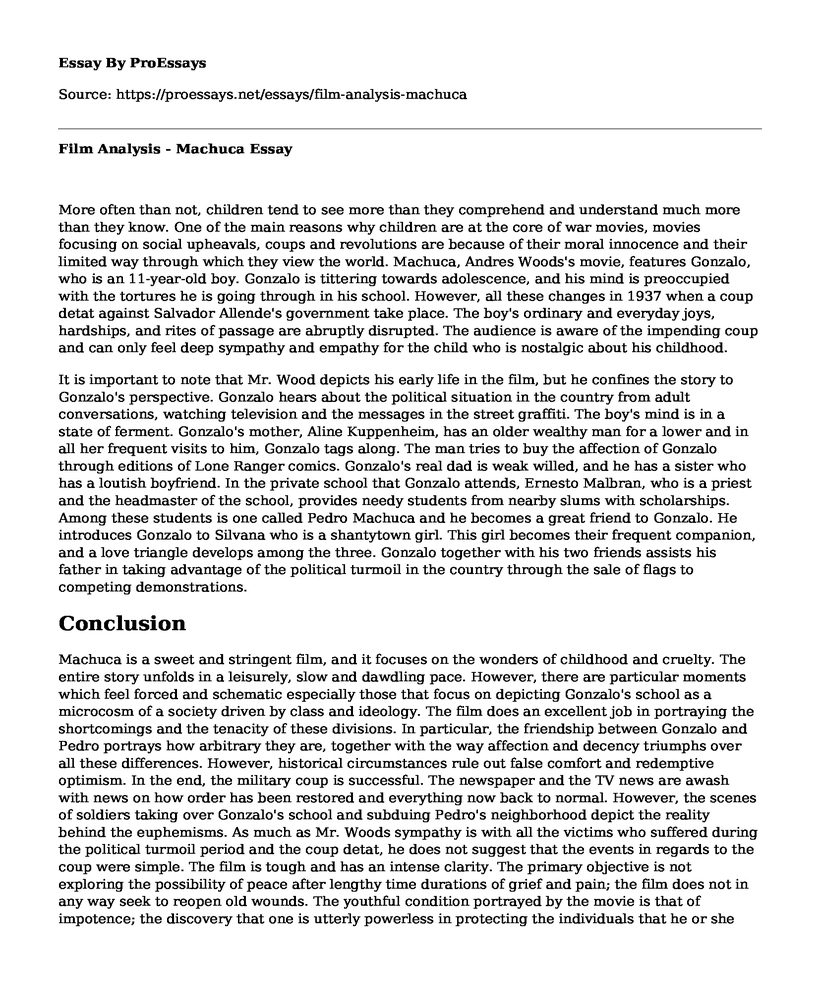More often than not, children tend to see more than they comprehend and understand much more than they know. One of the main reasons why children are at the core of war movies, movies focusing on social upheavals, coups and revolutions are because of their moral innocence and their limited way through which they view the world. Machuca, Andres Woods's movie, features Gonzalo, who is an 11-year-old boy. Gonzalo is tittering towards adolescence, and his mind is preoccupied with the tortures he is going through in his school. However, all these changes in 1937 when a coup detat against Salvador Allende's government take place. The boy's ordinary and everyday joys, hardships, and rites of passage are abruptly disrupted. The audience is aware of the impending coup and can only feel deep sympathy and empathy for the child who is nostalgic about his childhood.
It is important to note that Mr. Wood depicts his early life in the film, but he confines the story to Gonzalo's perspective. Gonzalo hears about the political situation in the country from adult conversations, watching television and the messages in the street graffiti. The boy's mind is in a state of ferment. Gonzalo's mother, Aline Kuppenheim, has an older wealthy man for a lower and in all her frequent visits to him, Gonzalo tags along. The man tries to buy the affection of Gonzalo through editions of Lone Ranger comics. Gonzalo's real dad is weak willed, and he has a sister who has a loutish boyfriend. In the private school that Gonzalo attends, Ernesto Malbran, who is a priest and the headmaster of the school, provides needy students from nearby slums with scholarships. Among these students is one called Pedro Machuca and he becomes a great friend to Gonzalo. He introduces Gonzalo to Silvana who is a shantytown girl. This girl becomes their frequent companion, and a love triangle develops among the three. Gonzalo together with his two friends assists his father in taking advantage of the political turmoil in the country through the sale of flags to competing demonstrations.
Conclusion
Machuca is a sweet and stringent film, and it focuses on the wonders of childhood and cruelty. The entire story unfolds in a leisurely, slow and dawdling pace. However, there are particular moments which feel forced and schematic especially those that focus on depicting Gonzalo's school as a microcosm of a society driven by class and ideology. The film does an excellent job in portraying the shortcomings and the tenacity of these divisions. In particular, the friendship between Gonzalo and Pedro portrays how arbitrary they are, together with the way affection and decency triumphs over all these differences. However, historical circumstances rule out false comfort and redemptive optimism. In the end, the military coup is successful. The newspaper and the TV news are awash with news on how order has been restored and everything now back to normal. However, the scenes of soldiers taking over Gonzalo's school and subduing Pedro's neighborhood depict the reality behind the euphemisms. As much as Mr. Woods sympathy is with all the victims who suffered during the political turmoil period and the coup detat, he does not suggest that the events in regards to the coup were simple. The film is tough and has an intense clarity. The primary objective is not exploring the possibility of peace after lengthy time durations of grief and pain; the film does not in any way seek to reopen old wounds. The youthful condition portrayed by the movie is that of impotence; the discovery that one is utterly powerless in protecting the individuals that he or she cares about from harm, and also powerless to protect oneself against the shame of your failure.
Cite this page
Film Analysis - Machuca. (2021, Mar 04). Retrieved from https://proessays.net/essays/film-analysis-machuca
If you are the original author of this essay and no longer wish to have it published on the ProEssays website, please click below to request its removal:
- African Americans in the United States Essay
- Children of Dust by Ali Eteraz Essay Example
- Research Paper on Celebrating Diversity in Little Havana: Miami's Cultural Center
- Essay Sample on Cultural Diversity in India: Interview with Jack Arjun Aditya
- Essay Sample on Architects: Designing for Justice in Marginalized Populations
- Neurological Disorders: Alzheimer, Epilepsy, Parkinson's, Brain Tumors, Stroke, Migraine +more - Essay Sample
- Research Paper Sample on Protecting Privacy on Social Network Platforms: Strategies







